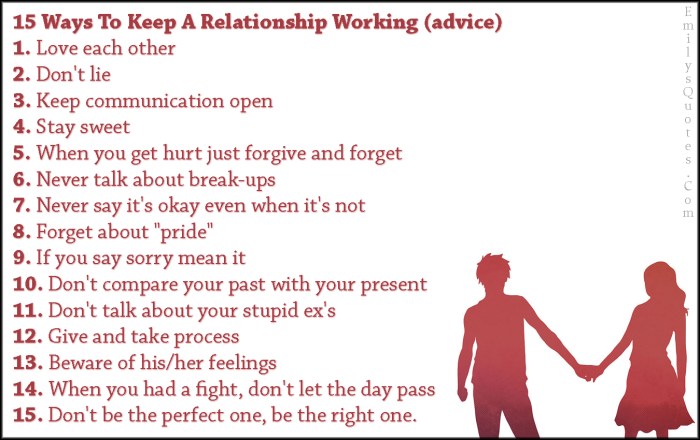Relationship Advice sets the stage for this enthralling narrative, offering readers a glimpse into a story that is rich in detail with American high school hip style and brimming with originality from the outset.
Relationship advice is like the ultimate guide to navigating the murky waters of love and connection. With insights on conflicts, trust, and communication, it’s the secret weapon to keeping your relationship on point.
Importance of Relationship Advice

Relationship advice is crucial for maintaining healthy and strong relationships. It provides valuable insights and guidance on how to navigate the ups and downs of a relationship, ultimately helping partners grow closer together. Seeking relationship advice can make a significant difference in the quality of a relationship by addressing issues, enhancing communication, and fostering trust and intimacy.
Resolving Conflicts and Improving Communication, Relationship Advice
Effective relationship advice can offer strategies for resolving conflicts in a constructive manner. By learning how to communicate effectively and listen actively, partners can address misunderstandings and disagreements more productively. Relationship advice encourages open and honest communication, leading to a deeper understanding of each other’s perspectives and feelings.
Building Trust and Intimacy
Relationship advice plays a key role in building trust and intimacy between partners. It helps individuals understand the importance of honesty, vulnerability, and empathy in a relationship. By following the guidance provided, couples can create a safe and supportive environment where they feel comfortable sharing their thoughts, emotions, and desires. This, in turn, strengthens the bond between partners and enhances the level of intimacy in the relationship.
Sources of Relationship Advice

Seeking relationship advice is essential for maintaining healthy and fulfilling relationships. Here are some common sources where individuals can seek relationship advice:
Therapists and Counselors
- Professional therapists and counselors are trained to provide expert guidance and support for relationship issues.
- They offer a safe and confidential space for individuals to discuss their concerns and work towards solutions.
- Therapists can help couples improve communication, resolve conflicts, and strengthen their emotional connection.
Friends and Family Members
- Friends and family members can offer a different perspective on relationship challenges based on their own experiences.
- They provide emotional support and can be a source of comfort during difficult times.
- However, their advice may be biased or limited by their personal relationship dynamics.
Self-Help Books
- Self-help books offer a wide range of relationship advice and strategies for individuals to work on their relationships independently.
- They provide valuable insights and practical tips for improving communication, building trust, and resolving conflicts.
- Reading self-help books can empower individuals to take proactive steps towards relationship growth.
Online Forums and Platforms
- Online forums and platforms provide a convenient way for individuals to seek advice anonymously from a diverse community.
- They offer a wide range of perspectives and experiences that can help individuals gain new insights into their own relationships.
- However, the quality of advice on online platforms may vary, and it’s important to consider the credibility of the sources.
Common Relationship Issues
Relationships can face a variety of challenges that can test the bond between partners. Here are some common issues that people seek advice for:
Trust Issues
Trust is essential in any relationship, and when it’s broken, it can be difficult to rebuild. Here are some insights on how to address trust issues:
- Open Communication: Discuss your concerns and feelings openly with your partner to rebuild trust.
- Consistency: Show consistent behavior and follow through on promises to demonstrate reliability.
- Therapy: Consider seeking the help of a therapist to work through trust issues together.
Conflict Resolution
Conflicts are inevitable in relationships, but how you handle them can make a big difference. Here are some strategies for handling conflicts constructively:
- Active Listening: Listen to your partner’s perspective without interrupting or becoming defensive.
- Empathy: Try to understand your partner’s feelings and point of view, even if you disagree.
- Compromise: Look for solutions that meet both of your needs and find a middle ground.
Communication in Relationships
Effective communication is the key to maintaining a healthy and strong relationship. It allows partners to express their thoughts, feelings, and needs openly, leading to better understanding and connection.
Tips to Improve Communication
- Practice active listening: Give your partner your full attention when they are speaking, show empathy, and avoid interrupting.
- Be clear and honest: Communicate your thoughts and emotions openly, and avoid passive-aggressive behavior.
- Use “I” statements: Express your feelings and needs using phrases like “I feel” or “I need,” to avoid blaming or accusing your partner.
- Set aside time to talk: Make sure to have regular conversations with your partner to discuss important topics and check in on each other’s feelings.
Role of Active Listening in Resolving Conflicts
Active listening plays a crucial role in resolving conflicts by allowing both partners to feel heard and understood. It involves fully concentrating on what your partner is saying without formulating a response in your mind. By listening actively, you can show empathy, validate your partner’s feelings, and work together towards finding a solution. Remember, effective communication is a two-way street, so make sure to listen as much as you speak in your relationship.
Long-Distance Relationships
Maintaining a strong connection in a long-distance relationship can be challenging, but with the right strategies and communication, it is possible to make it work. Here are some tips to help you navigate the difficulties of being apart from your partner.
Strategies for Maintaining Connection
- Set regular communication routines to stay connected, whether it’s through texts, calls, video chats, or emails.
- Plan virtual date nights to spend quality time together, even when miles apart.
- Send surprise gifts or care packages to show your love and appreciation for each other.
- Share your daily experiences and thoughts to keep each other updated on your lives.
Coping with Challenges
- Establish trust and transparency in your relationship to avoid insecurities and doubts.
- Focus on the positives of the situation, such as personal growth and independence.
- Stay busy with hobbies, work, or social activities to keep yourself occupied and fulfilled.
- Plan visits or trips to see each other in person whenever possible to strengthen your bond.
Utilizing Technology for Communication
- Use messaging apps, social media, and video call platforms to stay connected in real-time.
- Share photos, videos, and voice messages to make your communication more personal and engaging.
- Explore online activities together, such as watching movies simultaneously or playing games as a couple.
- Utilize relationship apps to track your milestones, set goals, and maintain a sense of togetherness.